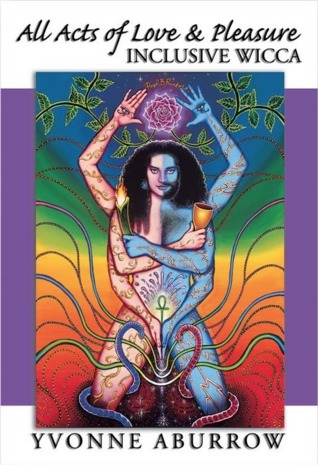There’s been a bit of a trend lately for AI-generated “what would you look like as a Viking” pictures. I’m boycotting AI for various reasons (it’s soulless, I don’t like where it is headed, it’s currently unregulated, and AI “art” plagiarizes human art). So I thought I would search for a nonbinary Viking image created by a real artist and post that instead. I found a picture of a dead nonbinary Viking, which was featured in a really interesting article about a nonbinary Viking burial (obviously the Vikings didn’t necessarily have the same ideas about gender as we do, but this burial has both male and female accoutrements and the deceased person had Klinefelter syndrome).
Continue readingnonbinary
People who menstruate
“People who menstruate” includes cis women, trans men and nonbinary people who menstruate.
It also correctly excludes post-menopausal people, and trans women, neither of whom menstruate.
Continue readingGardnerians speak!
Recently some transphobic people claimed that they are more traditional than Gardnerians who are welcoming and inclusive. Several people have written or spoken to refute their transphobic nonsense and their claims to be more traditional, including me, Mortellus, Jack Chanek, Jason Mankey, Ash the Gardnerian Librarian, and Dylan. I’m going to try to collect all the YouTube videos, Instagram videos and posts, blogposts, and tweets here — so please add a link to yours in the comments if I missed you out.
Continue readingGender versus sex
The Overton Window is in different positions in different parts of the world. What seems obvious to many people is baffling to someone else. This is exacerbated by the different social media bubbles that we all inhabit. One example of this polarisation is the argument about trans rights. So here’s an attempt to explain it for people who are sitting on the fence, or not familiar with the arguments.
Continue readingHappy International Nonbinary People’s Day
Thursday 14 July is International Nonbinary People’s Day—a day for raising awareness and organizing around issues that nonbinary people face around the world since it was first observed in 2012.
Nonbinary people are nothing new. We aren’t confused about our gender identity or trying to be trendy—nonbinary identities have been recognized for millennia by cultures and societies across the globe.
It’s important for nonbinary people to be able to live, dress, and have our gender respected at work, at school, and in public spaces.
Continue readingTrans Day of Visibility
Today is International Trans Day of Visibility.
It’s more important than ever that everyone stands with trans and nonbinary people, as there’s a concerted campaign to erase us from existence.
Continue readingGender and the English language
English can sometimes be a really good language to be nonbinary in; and sometimes it can be awful. This is mostly because of the unmarked default, and sometimes it is because of words that have been badly imported from elsewhere.
However, I want to reiterate what I’ve stated elsewhere: people’s needs and lived experience are more important than grammar or linguistics. Uncontroversial case in point: the word Wicca meant a male witch in Old English; now it means a whole tradition.
Continue readingBook review: Queer Qabala
Queer Qabala by Enfys J Book
Incredibly clear, beautifully written explanation of the Hermetic Qabala and its inherent queerness, expressed in the idea that there are three pillars (force, balance, and form), and that the Divine includes all genders and sexualities.
The book is written with style and wit by an expert in the subject. There are pathworkings to help you fully experience all aspects of the Qabala, and journal exercises to deepen your understanding of the worlds, spheres, and pathways of the Tree of Life.
All the aspects of the Tree are related to queer experiences and life events like coming out to yourself and others, and finding queer community. It explores both the wonderful and the scary aspects of being queer, including queer joy and sorrow.
This exploration of the many aspects of the Tree is grounded in a deep knowledge of the Qabala, and the overlapping Pagan and queer communities. This is a vision of Qabala that understands the importance of cyclicity: growth and decay, death and rebirth, darkness and light, immanence and transcendence, the manifest and the unmanifest.
It offers magical workings based on queer Qabala which relate to each sphere of the Tree of life and everyday experiences like getting a job or finishing a project. It is pragmatic and fun, accessible and inclusive.
This book will be valuable to everyone from beginners, who will find the subject thoroughly explored and explained, to people who are already working with Qabala, who will gain a fresh perspective on it. Sure to be a contemporary classic!

If you enjoyed this post, you might like my books.
Nonbinary
Terms for being nonbinary.
Alok has an interesting post up on Instagram about the term nonbinary, saying that it is unsatisfactory because it is a negation.
Continue readingAdding your pronouns online
Why
“It’s helpful for cisgender people from both within the LGBTQ+ community and outside of it to include their pronouns in their bio as it creates a safer environment for trans people. It opens a safe space to talk about pronouns and it also lets those of us who use different pronouns to share ours without being the odd one out. When cisgender people share their pronouns whether it be in an online bio, on a name tag, or shared face to face during introductions it helps to normalize the act of sharing one’s pronouns in all settings not just LGBTQ+ ones. This helps us not only normalize sharing and asking about pronouns, but it also helps to normalize the larger trans community and its umbrella communities. Everyone should be able to feel comfortable with their pronouns and have their pronouns respected by others.”
from Why cisgender individuals should put their pronouns in their bio
Continue reading

